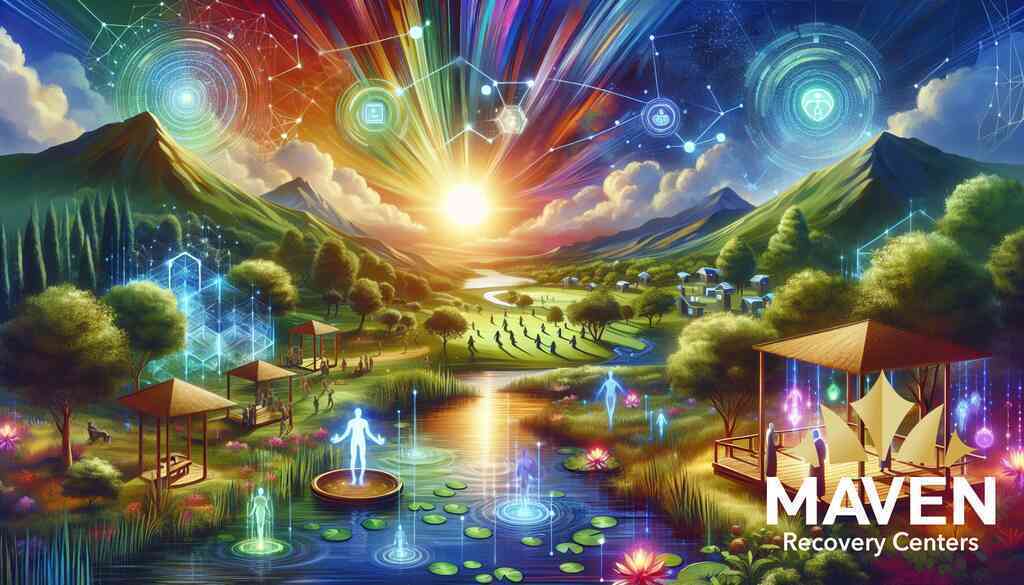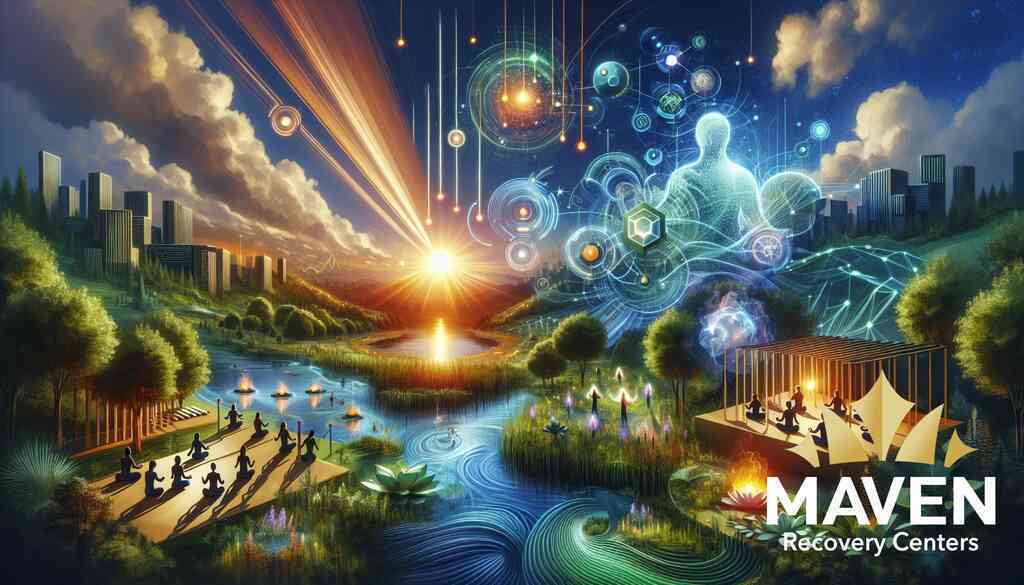
What Are Addiction Resources in California for 2025
March 26, 2025
Pioneering the Future of Addiction Recovery
The Evolving Landscape of Addiction Resources in California
In 2025, California is set to redefine how addiction resources are approached, building on its innovative legacy in the field. The state’s commitment to enhancing addiction recovery is reflected in the extensive array of resources available, each designed to cater to diverse needs. From urban centers to rural outreaches, the focus is on accessibility and inclusivity to ensure that everyone in need can receive appropriate care. California addiction support resources in 2025 emphasize integration, offering a holistic approach that bridges traditional therapies with modern interventions. This evolving landscape prioritizes the needs of communities, ensuring that these resources evolve with a deep understanding of cultural and demographic intricacies.
Revolutionary Treatment Modalities for a New Era
As the addiction treatment sector advances, new modalities are emerging that promise revolutionary impacts on recovery outcomes. California’s approach fosters a dynamic environment where therapies are not only innovative but also deeply rooted in evidence-based practices. These modalities explore avenues such as trauma-informed care enhancing recovery, ensuring that past traumas are acknowledged and addressed as part of the healing journey. Furthermore, the rise in strength-based addiction recovery methods highlights a shift towards empowering individuals to take charge of their sobriety. The commitment to transformative approaches is evident in the sustained efforts to incorporate culturally sensitive strategies that respect and acknowledge the individual’s background and experiences, as highlighted in Maven Centers’ Dual Diagnosis Therapy Insights.
Harnessing Innovation and Technology in Addiction Care
The advent of digital health technology reshapes addiction therapy, setting the stage for unparalleled innovations from 2025 onwards. Technologies like virtual reality and AI integration are no longer futuristic concepts but integral parts of the treatment landscape. Telehealth services for addiction therapy in California provide not only flexibility but also widen the reach of essential services to underserved populations. Furthermore, AI integration in personalized addiction treatment allows for tailored programs that adapt to the unique needs and responses of each patient, maximizing the effectiveness of interventions. These technological advancements facilitate a comprehensive approach to addiction care, underscoring California’s commitment to innovation beyond conventional paradigms in aiding recovery.
Innovative Treatment Paradigms: A New Horizon
Personalized Treatment Plans and AI Integration
California’s addiction recovery landscape is embracing the future with AI integration in personalized addiction treatment, revolutionizing how recovery programs are crafted. By harnessing the power of artificial intelligence, treatment providers can develop highly tailored plans that adapt in real time to the unique needs of each individual. Such personalized approaches are proving to be incredibly effective, ensuring that every client receives the specific care they need at any given moment. The use of AI not only enhances precision in treatment but also accelerates the recovery process, making it more efficient and less prone to setbacks. Moreover, this technological advancement is fostering a new era of data-driven insights into addiction patterns, facilitating more informed decision-making for practitioners.
Holistic Recovery and Mind-Body Wellness Approaches
The shift towards mind-body wellness for addiction recovery in 2025 highlights California’s commitment to addressing addiction with comprehensive care strategies. Holistic recovery is an umbrella for techniques that integrate physical, emotional, and spiritual health, recognizing the complex interplay between these facets in the journey to sobriety. This approach emphasizes the importance of activities like yoga, meditation, and tai chi, which are instrumental in cultivating inner peace and resilience against relapse. By fostering a balanced lifestyle, holistic methods empower individuals to rebuild their lives with a fortified sense of self-awareness and mindfulness. California’s centers are front-runners in integrating cutting-edge practices with traditional wellness strategies, creating environments where recovery transcends beyond mere abstinence.
Trauma-Sensitive and Culturally Adaptive Therapies
The inclusion of trauma-informed care enhancing recovery is pivotal in California’s addiction recovery framework. Recognizing that unresolved trauma often fuels substance abuse, trauma-sensitive therapies ensure that individuals are supported through compassionate and informed care. These therapies are designed to help clients untangle the complex layers of psychological harm resulting from past experiences, catalyzing profound healing and progress in recovery. Furthermore, culturally adaptive therapies ensure that treatment plans are respectful of and tailored to the diverse backgrounds of clients, acknowledging their unique cultural perspectives and narratives. Such adaptive methods reinforce individuals’ sense of identity and belonging, essential components for successful long-term recovery.
Green Spaces and Eco-Friendly Rehab Centers
The integration of eco-friendly rehab centers in California is an innovative step towards sustainable and therapeutic addiction recovery environments. These centers are architecturally designed to minimize environmental impact while maximizing natural healing elements, such as sunlight, fresh air, and serene landscapes. Green spaces within rehab facilities offer clients an opportunity to reconnect with nature, supporting mental clarity and reducing stress levels, both crucial for effective addiction treatment. By prioritizing ecological mindfulness, these centers not only contribute to environmental sustainability but also model responsible living. Such designs are paving the way for a new standard in recovery environments, where participants are nurtured by the calming presence of nature, aiding their journey toward sobriety.

Technology-Driven Recovery: The Digital Frontier
Telehealth and Virtual Reality in Addiction Therapy
In 2025, telehealth and virtual reality in addiction therapy will be at the forefront of California’s drive to support individuals struggling with substance abuse. Telehealth offers unparalleled access, providing an inclusive platform where clients can receive therapy regardless of geographical limitations. This flexibility ensures that everyone can benefit from professional guidance without barriers, fostering a supportive framework for alcohol addiction recovery in California. In addition, virtual reality creates immersive experiences that enable clients to confront triggers within a safe and controlled environment, effectively equipping individuals with the coping skills necessary to manage and overcome urges. These innovations are pivotal in augmenting traditional drug addiction treatment in California, enhancing outcomes, and optimizing the recovery experience.
Digital Recovery Tools and AI-Enhanced Support Systems
In the digital age, advancements in AI-enhanced support systems are transforming how recovery is approached and understood. Digital Recovery Tools in California delivers seamless, personalized assistance, adapting to the intricate needs of each client in outpatient addiction therapy in California. These tools integrate data from diverse sources to provide clients with real-time feedback about their progress, which aids in maintaining motivation and engagement. Moreover, AI technologies can analyze patterns to anticipate potential relapses, prompting early interventions. This predictive capability empowers counselors to execute drug rehab California strategies preemptively, supporting sustained recovery and fostering resilience against relapse.
The Role of Emerging Technologies in Long-Term Recovery
Emerging technologies are instrumental in shaping the future of long-term recovery programs in California. Innovations in AI and machine learning are crafting bespoke rehabilitation pathways that consider the myriad factors affecting mental health and addiction in California. These pathways are not static; instead, they evolve as the individual progresses, ensuring that the approach remains relevant and practical. Furthermore, enhanced virtual connectivity encourages ongoing participation in recovery support groups in California, strengthening community ties and support networks crucial for enduring sobriety. By harmonizing cutting-edge technology with compassionate care, California sets a benchmark in addressing addiction challenges comprehensively and with precision.
Community Empowerment and Support Ecosystems
Peer-Led Initiatives and Recovery-Driven Social Enterprises
California’s addiction recovery landscape in 2025 prominently features peer-led recovery initiatives for addiction that leverage the power of community. These initiatives empower individuals in recovery to lead, create, and sustain supportive networks essential for enduring sobriety. Recovery-driven social enterprises also emerge as influential components, offering platforms for empowerment and skill-building. These enterprises foster economic opportunities and a supportive environment, reducing stigma and encouraging societal reintegration. By merging peer support with entrepreneurial endeavors, California sets a new standard for sustainable recovery networks, emphasizing mutual aid and shared experiences to bridge personal and communal growth.
Strength-Based Recovery and Adaptive Community Programs
In the evolving journey of addiction treatment, strength-based addiction recovery methods gain momentum, focusing on reinforcing individuals’ internal resources and potential. These methods prioritize an individual’s strengths over their deficits, fostering a positive outlook crucial for sustainable recovery. Adaptive community programs complement this by tailoring support services that resonate with diverse community needs. These programs are adaptive and dynamic, integrating cultural sensitivities and local contexts to offer personalized support. The combined force of strength-based and adaptive approaches nurtures a resilient recovery ecosystem where participants build on their inherent strengths, fueling transformation and long-term success.
Public Health Approaches and Cross-Cultural Treatments
Public health approaches to California addiction recovery in 2025 emphasize a holistic societal perspective, advocating for comprehensive policies that address the multifaceted nature of addiction. These approaches foster collaboration across various sectors, spotlighting prevention and education as pillars of community resilience. In tandem, cross-cultural treatments enhance the inclusivity of addiction services, respecting the rich tapestry of cultural identities within California. By amalgamating diverse healing practices and perspectives, these treatments offer culturally congruent care that resonates deeply with clients. This synergy between public health strategies and culturally adaptive methods underscores California’s commitment to an inclusive, community-centric addiction recovery framework, promising equitable access and empowerment for all.

Conclusion: Charting New Paths to Sobriety
Building a Future of Hope and Resilience
As California continues to innovate in the realm of addiction recovery, the future is bright with promise. The diverse California addiction support resources in 2025 are not just a reflection of cutting-edge practices but also of a community deeply committed to empowering individuals on their journey to sobriety. Each resource caters to individuals’ unique needs, enhancing resilience and hope. The multifaceted approaches, from AI-driven personalization to community-based empowerment, ensure that every person finds support that resonates with their narrative, fostering an environment primed for long-lasting recovery.
The Commitment to Innovative and Compassionate Care
California’s unwavering commitment to Innovation in addiction treatments for 2025 sets a precedent for compassionate and effective care. Maven Recovery Centers exemplify this through their integration of evidence-based practices with innovative therapies, creating a haven where recovery is not only possible but sustainable. Their facilities prioritize individual dignity and holistic wellness, ensuring a treatment experience that is deeply personal and transformative. The combination of technology, traditional therapeutic practices, and community involvement underscores a profound commitment to healing and empowerment across the state’s diverse population.
Envisioning a Collaborative Future in Addiction Recovery
In envisioning the future of addiction recovery, collaboration, and community stand at the forefront. The synergy between personalized care, innovative therapies, and community initiatives builds a cohesive framework where recovery is a shared journey rather than a solitary endeavor. As we move towards 2025, the landscape is set to evolve further, with cross-sector partnerships and increased awareness bolstering the support systems. This collaborative spirit ensures a robust network that empowers individuals and communities alike, fostering enduring recovery and a brighter future. By championing shared goals and nurturing empathy, California paves the way for a future where sobriety is achievable and celebrated by all.
Frequently Asked Questions
Question: How does Maven Recovery Centers integrate AI in addiction recovery in California to offer personalized treatment plans?
Answer: At Maven Recovery Centers, we harness the power of AI in addiction recovery in California to develop highly personalized treatment plans. Our AI technology constantly adapts to the individual needs of each client, optimizing recovery by addressing unique patterns and preferences, as highlighted in The Ultimate Guide to Holistic Addiction Treatment. This real-time customization enhances the precision of interventions, making the recovery process more efficient and less prone to relapse. By integrating AI, we ensure that each person receives tailored support at every stage of their sobriety journey. Exploring the Role of Evidence-Based Treatment Approaches
Question: What role does technology play in the digital recovery tools California offers by Maven Recovery Centers?
Answer: Maven Recovery Centers are at the forefront of integrating technology into addiction therapy with our comprehensive digital recovery tools in California. We utilize telehealth services and virtual reality therapy to expand access to care, providing flexible and inclusive treatment options. Our AI-enhanced support systems deliver personalized feedback and data-driven insights, which not only keep clients engaged but also help anticipate and prevent potential relapses. This technology-driven approach broadens our reach and effectiveness, ensuring every client has the opportunity to achieve sustainable recovery.
Question: How do Maven Recovery Centers’ eco-friendly rehab centers in California contribute to addiction recovery?
Answer: Our eco-friendly rehab centers in California are designed to blend sustainability with therapeutic environments. Reviewing California’s Holistic Treatment Methods, These centers prioritize minimal environmental impact while providing natural healing elements such as sunlight, fresh air, and serene landscapes, as detailed in How Maven Recovery Centers Innovate in Drug Detox. By creating spaces that reconnect clients with nature, we enhance mental clarity, reduce stress, and support holistic recovery. This approach underscores our commitment to fostering an environment where recovery transcends traditional methods, nurturing overall well-being and sobriety.
Question: How does the holistic addiction treatment California offered by Maven Recovery Centers address mind-body wellness?
Answer: At Maven Recovery Centers, we embrace holistic addiction treatment in California by emphasizing mind-body wellness as a cornerstone of our programs. This approach integrates techniques like yoga, meditation, and tai chi to promote physical, emotional, and spiritual health. By nurturing these aspects, we empower individuals to cultivate inner peace and resilience against relapse. Our comprehensive care strategies ensure that every client can rebuild their lives with enhanced self-awareness and mindfulness, establishing a balanced lifestyle essential for long-term recovery.
Question: What are some of the strengths of the community-based recovery programs in California at Maven Recovery Centers, as discussed in the blog What Are Addiction Resources in California for 2025?
Answer: The community-based recovery programs in California at Maven Recovery Centers are pivotal in nurturing sustainable sobriety. By focusing on strength-based recovery methods, we encourage individuals to build on their inherent resources and potential. Top Strategies for Long-Term Recovery in California Our peer-led initiatives empower clients to lead and sustain supportive networks, fostering mutual aid and shared journeys to recovery, as discussed in Reviewing California’s Holistic Treatment Methods. These programs are dynamic and adaptive, designed to resonate with diverse community needs and cultural contexts, ensuring personalized support. Family Support’s Impact on Relapse Prevention This community-centric approach is integral to our effectiveness, as it builds robust support systems essential for enduring recovery.


